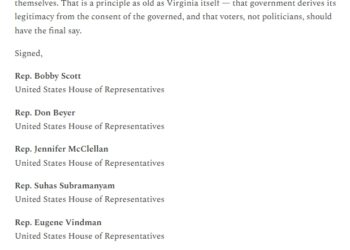
Agriculture Sec. Tom Vilsack said today that he is “reconsidering” his department’s decision to fire Shirley Sherrod from her USDA job because of a highly edited speech she made recently to a chapter of the NAACP. The edit seemed to portray her as some sort of “reverse racist” Ironically, her speech was one of her redemption from hatred caused by a tragic murder in her family done by racist whites.
In his statement Vilsack said that he will “conduct a thorough review and consider additional facts” about his decision to ask Sherrod to resign. Apparently, the pressure put upon him by people all over the country and the full release of the speech by the NAACP has changed his mind. (The national NAACP, by the way, was the first to jump to a wrong conclusion and throw Sherrod “under the bus.”) Also, Kyra Phillips of CNN has helped get out Shirley Sherrod’s true story.
The white couple she helped many years ago have also defended Sherrod. She “kept us out of bankruptcy,” said Eloise Spooner, in an interview with The Atlanta Journal-Constitution, adding she considers Sherrod a “friend for life.” She and her husband, Roger Spooner, approached Sherrod for help in 1986 when Sherrod worked for a nonprofit that assisted farmers, not for the USDA.
Here’s the full story of the motivation behind Sherrod’s speech.
Shirley Sherrod’s father, who was known by the white community in Baker County, Georgia, to be an activist seeking to end racial discrimination during the civil rights movement, was killed by white racists when she was young. He was murdered just before her high school graduation and before the birth of his sixth child and his only son.
Sherrod, who had been planning to go north to attend college, had all her future plans thrown into disarray. At the time, she rightly blamed whites for the death of the father she loved, but her speech wasn’t about that. Rather, it was a story about her redemption from those feelings toward whites after that horrible crime against her family.
Her speech was not a racist one, just the opposite. It was a story of racial healing, of one person who seemingly had justification for racial hatred yielding instead to love, learning to judge others “by the content of their character, not by the color of their skin.”
The wrongful accusation of Shirley Sherrod is a powerful example yet again – in a time when the hidden poison of racial prejudice has once more been stirred up by those on the far right who hope to benefit politically – that racial reconciliation must never end in this country.

![[UPDATED with Official Announcement] Audio: VA Del. Dan Helmer Says He’s Running for Congress in the Newly Drawn VA07, Has “the endorsement of 40 [House of Delegates] colleagues”](https://bluevirginia.us/wp-content/uploads/2026/02/helmermontage.jpg)
















